#estë of the wilds
Text
Imagine someone filming a nature documentary in Valinor, Almaren or even the Timeless Halls.
"The Ainur in their natural habitat"
"A wild Manwë perches on top of a mountain, preening its feathers while it waits for its mate to return"
"But actually this [distant screaming] is the sonorous war cry of a very angry Melkor"
"This lonely Aulë has been banned from its nest after procreating on its own. The offsprings are referred to as dwarves"
"The Estë is typically nocturnal"
"Scientists were shocked to find out that the Melian appears to be the only one mating outside its species, though some claim the Melkor has attempted to do so as well. Unfortunately, its mating behavior doesn't seem to impress females"
"The Mairon can typically be found in tower- or castle-like nests. It loves to adorn itself with self-made jewelry"
89 notes
·
View notes
Note
myths + finrod!!
thank you @that-angry-noldo! this was a very interesting combination to work with. prompt from this list.
1.
it was said of felagund that he felled a wolf with his teeth - nay, two. three, one beast with foul thick and dark as night, and one pale as the woeful face of the moon, and one grey as the waters of the sirion were grey after melkor breathed on them.
three wolves, all three greater than any wolf ever seen by men. felagund fought them in chains, and they each bit him, yet all three did he bite ere he died, finghting them as wild things fight, turning in the ground and making claws of his ringless hands.
afterwards he went uneaten; for all three wolves stumbled away from the teeth-bared wreck of the king, and sickened and howling in the horrible dungeons of sauron died. for all knew, and know still, that elves are strange and terrible when roused, and the eyes of even the kindest among them glow in the dark like the eyes of poisonous snakes, smooth to the touch and deadly as they strike.
2.
balan was enchanted. enthralled. these all the tribes of men that were not counted among the edain knew: the people of balan had laid down to sleep in a safe grove, and in the night a fairy had come and enthralled them.
thereafter they did its biding always. went to the kingdoms of the spirits of the woods and the stone, and dwelt in their golden halls under the mountains hewn by the dwarves. there balan the proud, chieftain and hunter without equal, served gladly as a vassal, pouring the endless cups of endless wine that the fairy king might drink deep.
so it happened, in that strange time, when the crossing of the mountains made such a strange difference between the people of men who lingered, and the mad and hungry and ambitious ones who dared to cross.
there were emissaries of monsters walking under the high firs, in those days, and strange green fairies who strode from the failed boughs to walk upon the wavering ferns, weightless and soulless. chieftains made accords with dangerous beings for their people’s sakes, and did not dare to either lie or speak truthfully.
a time of trickery and great deeds, with ghosts walking through the mists, and monsters sat singing in the dark. not even the great heroes of that time could escape their snares.
well they might try to escape the dark one, the killer of light, lord in the ice! well they might try, and count themselves free, and rest their heads upon the moss and the wildflowers; and still be caught by the spirits of the shining eyes, the greedy and whimsical and ever-young fairies from the west.
they grew strange, the people of balan. their names were never one only, but many. they sent their best sons to serve and learn and worship the ways of the elves, the shining elves from the far land across the uncrossable sea: and in exchange they had safe passage and safe fields, many heads of herding cattle and new mills.
and it was said that it was the enchantment of finrod the enthralled that lead such misfortune and grief to befall that bold line of men, and the first entwined and doomed beren one-handed with the fate of the great spirits, well-before he was born, that night when his forefather awake to a music more beautiful than the mannish heart can bear to hear.
3.
it is said in tírion-upon-tuna, and valimar the golden, and sea-loved alqualondë, that none of those gone beyond the sea may return unchanged. mandos may heal, and lórien may console, and estë may teach the bearing of memory; but the thing gone is not the thing returned. so it is debated by the noldor, and decreed by the vanyar, and found just in sea-loved alqualondë.
so it goes. there is a new voice in the forests, careful, slow and then enthusiastic, lilting short inquiries of birds and deer, laying down on its belly to peer with wonder at the perseverance of a hundred tadpoles swimming on the gentle curve of a creek. the golden pollen of many flowers gathers on its hair, and arien’s light lingers resplendent upon the up-tilted face, the upturned cheeks. the air is ever so warm, in the shadows of the most beautiful trees of arda. very warm, and very alive.
is it said, and well-said, that none that return come back unchanged. yet it might be said also, of finderáto who walked down the aisle of the tree, lonesome down the pathless groves, till he heard the far voices and silver sounds of music, and running found his way to his father: there is much that remains. the revenant that returns, strange and restless, does tend to know its way home.
#finrod#myths#asks and answers#this guy sure is myth-shaped!#house of beor#beor#finarfin#silm fic#the silmarillion
34 notes
·
View notes
Text
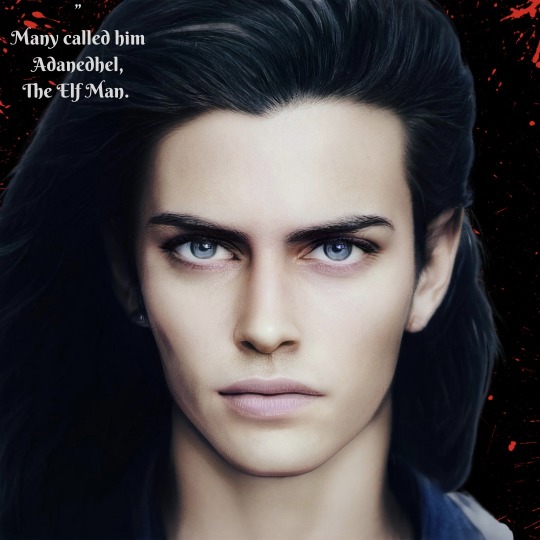
Túrin.
The excerpt below the cut is from Magnificat of the Damned Book II when his tomb was found late n the Third Age.
They were silent then, and the Sun seemed to hold itself in an orange-gold haze over the sea.
It had been so long. Sometimes, Vanimórë thought he could only feel the passage of the Ages when he considered Men. He had never been able to dwell on time, for he had never believed he would be free. He would have gone mad long ago had he considered the years of his slavery.
The last of the stones were laid aside. Huge and amber on the rim of the world, the Sun threw its light full into the cairn.
And an image rose over the isle and the ocean, misty as a caul: a land long sunk under the waves. Through the sea-brine Vanimórë smelled pine, heather, fresh water, heard its wild thunder. He understood now what he had not until his apotheosis: He had believed Time a river forever flowing onward, and so it was, but more than that. Everything that had ever happened, or ever would happen was now. And now Túrin confronted Glaurung above the seething fury of Cabed-en-Aras.
“We may not act,” Irmo cautioned them.
“Hail Worm of Sauron, well met again! Die now and the Darkness have thee!”*
They watched, for they were helpless to do anything else and there were tears on Estë's cheeks as a wind blew upon them that was birthed in past ages. They witnessed a young woman come running to the side of the unconscious man, her brother, her beloved husband and they heard Glaurung hiss venomous truth even as he died. Anguish burst over Nienor's face as she remembered her life, and her scream, as she hurled herself into the chasm of Cabed-en-Aras, was wild with madness, brutally truncated as her body struck the rocks. Her tall form, streaming hair, passed like mist through Vanimórë's hand as he reached out...
We may not act...
At the last Túrin, black haired, fey-eyed, recognizing the doom had come upon him spoke to the sword, Gurthang, and cast himself upon it. The cross-guard drove violently against his breast and he stiffened, crouched on hands and knees. Words fell like red jewels from his lips, all of them precious. Father, mother, Nienor, Finduilas, Sador, Gwindor...Beleg... It was a longer and harder death than the lays had it. And there was music, harp-song like tears.
Glorfindel went down on one knee beside the dying man. Vanimórë came from the brink of the chasm where Nienor had vanished and knelt opposite him. They had not been here, they were not here now, yet in some way they were, and Túrin knew it. Crimson dropped from his mouth, past hard gasps of agony, and he formed words.
“It is not ...ended.”
Through Time, their hands reached out, rested gently on the dark head; two Powers, who had themselves known pain, ached with Túrin, trying to draw his death agonies into themselves.
Glorfindel said softly: “Rest now,Túrin.”
“Oh, Beleg!” It was a groan holding grief that had never been healed, the most dreadful guilt, the deepest love. And still there was music all around them, as if Arda itself was a harp, and the harpist was weeping as he played.
As the past withdrew from them, the last sound they heard was the mourning roar of Teiglin.
#túrin turambar#video#silmarillion#art#fanfic#Magnificat of the damned book II: Resurrection#artbreeder#canva pro
16 notes
·
View notes
Photo
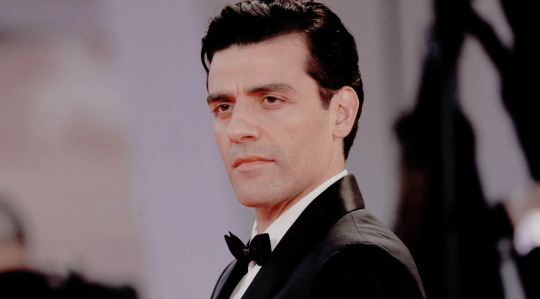


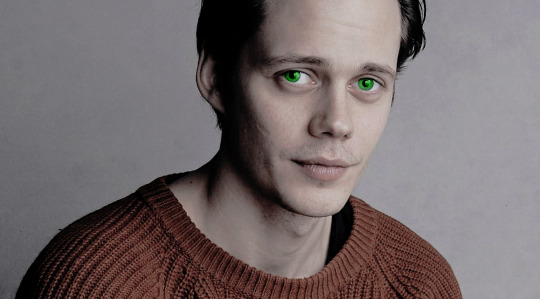

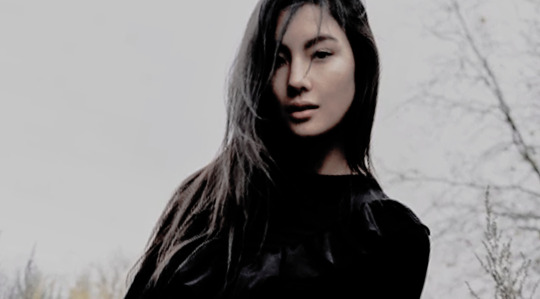

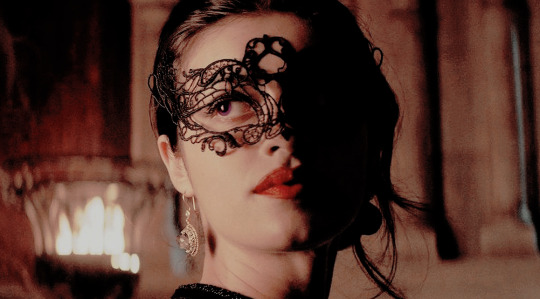


ERA DEL DRAGO
THE FERELDANS
Literally the same edit as before, just cropped so that I can use the images in codes. Sorted by nationality for funsies. lolz.
#allyrion lothston#lillian cousland#era del drago#dragon age#mine#my edits#clara's edits#graphics#valérian lothston#amarei lothston#silvius lothston#eddan lothston#olyvar lothston#celina serrett#alistair theirin#kara#warden cousland#luna#estë of the wilds#cast list#daedits
15 notes
·
View notes
Text
A few headcanons about Langon since I haven’t written much about him:
While the majority of Melkor’s servants among the Ainur were corrupted by him during the Ainulindalë, and their wills ultimately subjected fully to his, Langon was not. After entering Arda, he became a student of Irmo and, to a lesser extent, Estë.
Langon’s power-set involves conjuring illusions, as well as no small skill as a healer— primarily working with the healing of the spirit rather than the body, particularly in convincing the spirit to heal the body.
His primary elemental affinity is Spirit, with a weak tie to water.
He spent a lot of time travelling throughout Arda, and was captured by Melkor almost immediately after his return to Arda. Langon was present while Utumno was being built.
Langon was the first Unmarred Ainu that Melkor bent to his will. It was an extremely brutal process that left Langon bitter but subservient, without tarnishing his power. He had, however, been turned to darkness, and his nature permanently altered, so that though he despised Melkor, he had no desire to return to the service of the Valar.
He was Melkor’s herald, and equal in rank to Gothmog (the battle-lieutenant). He oversaw the operations of Utumno.
After Mairon was turned, Langon would frequently be instructed to collaborate with him on his experiments in Angband. Langon absolutely hated this, and hated Mairon just about as much as he hated Melkor.
It was not only cowardice that drove Langon to open the gates of Utumno for the armies of the Valar. In truth, he wished to see Melkor’s defeat— though he himself was unaware of this due to the partial control that Melkor’s will held over him.
Fearing the Valar, Langon flees from them into the wilds of the north, then returns after the Battle of the Powers to Angband, hoping to lay claim to it himself and become Melkor’s successor. Mairon did not allow this.
Langon was the first being to be destroyed as utterly as a being could be, and Mairon was the first to perform such a destruction (a fitting thing, as his own fate would be similar). He passed from all consciousness after his destruction, remaining as only a shadow of anger and pain imbued within some of Mairon’s inventions— all but impossible to ever be restored.
27 notes
·
View notes
Text
Celebrían thoughts
The ultimate outdoorself. Loves long walks and climbing trees and catching frogs.
Celeborn likes to comment that she would have been a marchwarden if she were born in Doriath. Much of her time in Lothlorien is spent with the patrols, especially after the orcs establish themselves in the mountains.
Fast and sporty like her mom!
Also, way too tall like her mom.
Crafty mostly as a way to pass the time between other ventures, her one true skill is basketweaving. She also loves sitting and watching other people work, she can admire the beauty in art even if it’s not her forte.
Very cognizant of her familial history and the weight of all those great deeds just one or two generations before her. It’s one of the things she and Elrond bond over, the inability to be inconsequential.
Elladan and Elrohir take after her the most; the three of them used to wander up and down the valley together, the rangers of Rivendell. It’s much harder to see Arwen’s similarity to her mother, especially at first glance. But if you were able to listen in on all the times that she nestled against her and complained that she didn’t want to be Lúthien, she wanted to be Arwen, it would make a bit more sense.
A bit of a linguist and diplomat, though she claims it’s wholly accidental, a side-effect of wanderlust. When you travel enough you end up picking up languages and people skills! She was on excellent terms with the dwarves of Moria and a very well known friend to the kingdom of Arnor and other Mannish settlements.
Got along with Gandalf very well. She’s the one who introduced him to gunpowder (she picked up the recipe off of a dwarf friend) and the one who suggested Círdan give him Narya.
She tells excellent stories, every retelling a little different, and likes to make fun of her poor forgetful half-human husband who needs books and lettering to keep his tales in line.
A decent warrior, though it’s not her favorite role to take. Fought in the War of Elves and Sauron and the Last Alliance, thought it was awful, and continued on nonetheless. Has some very light repressed PTSD, as most elves who have seen at least one war do.
Because she knew the land and carried weapons she thought she could manage the Redhorn Pass with just a few companions.
A large part of her grief following her capture and injuries are how much they limit her activity. The poison keeps her inside, keeps her from running or traveling or even seeing guests. She feels trapped, undone, and even as she slowly heals the fear of the outdoors she once loved remains.
In Valinor she remains somewhat agoraphobic, antsy in the wilds in ways she never was before, but she manages to compensate for it. She gets very into gardening and carpentry, she builds a little library for Elrond. She makes friends with some of Oromë’s people, who are always happy to accompany her into the woods so she doesn’t feel alone. She meets all her relatives and discovers that they’re more approachable as people than as historical figures.
Has a little support group with Celebrimbor, Gil-Galad, and some others where they make their biscuits the Eriador way and complain about being subjected to torments (not allowed to compare torments, that never ends well) and sometimes do Estë-approved psychadelics together.
As the years pass and she recovers more she occasionally joins Eärendil and Elwing on the Vingilot, to look down on the world where her daughter’s children dwell.
27 notes
·
View notes
Note
Hi! I was wondering if you had any thoughts on the Valar and animal companions? Are there any they feel particularly akin with, etc. Love reading your headcanons!
Oh I love this ask! I'm combining what we know of their domains and any animals associated with them with my own thoughts!
under cut just for length! I’d love to hear anyone else’s thoughts on this! I love thinking about creatures in the context of Silm so feel free to ask more questions about this!!
Manwë: the eagles of course! But I picture him just sort of surrounded by birds in general. Perching on him, fluttering around him, etc.
Varda: This one was harder! I’ve talked about it before but Varda is far less physical than Manwë is, even when she appears vaguely human or elf shaped she’s still composed primarily of vapors and light rather than flesh and bone. I do love art of sea creatures flying among the stars though. Perhaps there are magical rays that fly through her domain. Some of them like eagle rays have night sky like patterns!
Oromë: Hounds and horses obviously! And great, prehistoric elk like creatures. And @aronoiiel and I have a headcanon that he also has a huge black panther that aids him in hunting more dangerous creatures.
Vána: So she does seem to be associated with songbirds but I also like butterflies, it reminds me of what @undercat-overdog said about rebirth and growth/fertility as part of her domain.
Ulmo: So many amazing sea and water creatures! This was so hard! Sea birds definitely, already many of the Valar are bird associated. Also seals. I also really like frogs? I mean rain and streams are also apart of his domain. I like frogs being little messengers for him.
Nienna: Elephants. Large, gentle but destructive too. And they mourn like we do. And the gray colors.
Aulë: I really like him with salamanders. Not just regular ones but mythical ones, ones that live in firewood and can catch fire themselves. They’re always on him, in his forge apron pockets and hair!
Yavanna: I like wildebeests for her. And beetles. I don’t really have reasons for this. I suppose they are just opposite ends of the animal kingdom. Or not literally, there are creatures more apart from large animals but still.
Irmo: Moths. I love associating him with moths. Especially Luna moths.
Estë: Both her and Irmo I associate with nightingales. But I also imagine for some reason manatees living in her lake. Slow, gentle, peaceful to watch.
Vairë: I was thinking perhaps a tailor bird or cave swallow or another bird that is known for making elaborate nests by ‘weaving’ or ‘stitching’. Or maybe silkworms! I guess those aren’t really a companion though.
Námo canonically has a dog in the book of lost tales which is amusing to me! I suppose this is cliched but I do love ravens with him. Not even for the death symbolism, more for the variety of dry, deadpan corvid characters in literature that fits how I see his personality.
Tulkas: I really love the idea of him sharing a love of wild cats with his brother in law. Also look at the art @forestials did here of him with a serval, it’s so beautiful and perfect for him.
Nessa: deer of course! All kinds of deer, not just English or American ordinary ones. though she also joins in with her brother and husband with the wild cats.
Melkor: he keeps elves as pets? but like also dragons. and according to BoLT snakes. large ones. And there are wolves in the fortress though they are more Sauron’s than his.
32 notes
·
View notes
Text
his original name, as one of the maiar, was ithīrphelûn (valarin) & (quenya) ethísë. and it was given to him by Estë.
was named by mannish people as ‘DRACU.LA’. due to his dealings in cities like Dale and Laketown however, he has enforced the title of The Count in order to scare his way into being treated as an equal. he is viewed only as a monster, however, and has vanished into folklore by the beginning of the third age.
was gifted the name ‘ turlómë ’‘ by melkor. which means great shadow.
drac.ula originally served Estë as one of her diligent servants, and some rumors say he was jealous of irmo for hoarding her beauty for himself.
corrupted by melkor/exploited due to his own unrest with the rest of the valar and the story of melkor’s treatment piqued his sympathy.
what sympathy he held for morgoth eventually evaporated as he slid further and further into corruption, but at that time he had already become twisted into the shape of insatiable hunger.
while his ‘true’ form has been twisted into that of a horrible bat creature, he employs a glamour of sorts that gives him a tall, muscular form that resembles one of the Noldor, but pale as if a walking corpse. THIS FORM HAS ODD PECULIARITIES THOUGH; his eyes are red and they glow in the dark, his nails are sharp and dangerous and his teeth are very white and very sharp.
he is capable of great magical feats and transformation, but is lazy and tends only to use magic that appears to be based in shadow. there are rumors that he is a necromancer of sorts.
he and thuringwethil were the only two morvul with the capabilities to create new morvul through the feeding of twisted blood. but this process could take literal years.
he can live off the blood of all living things. but he gets a special rush out of drinking from immortal things. especially from things that are not meant to die, such as elves. / WILD ROSES REPEL HIM.
#♔. ˋ twas a dirge of smoke and billowing inky blackness . ˊ tolkien.#finally posting this bc i have the need#also will be reblogging my post of his two forms since i have more tolkien followers
4 notes
·
View notes
Text
On Elven Gender Roles
Have been rereading “Laws and Customs of the Eldar” and noticed a couple things.
1) Elven gender roles don’t work the same as human ones, in that there’s no stigma associated with being an exception to the general tendency. It’s just a description of what the common preferences are. All these things [various activities], and other matters of labour and play, or of deeper knowledge concerning being and the life of the world, may at different times be pursued by any among the Noldor, be they neri [male elves] or nissi [female elves].
2) The baking of bread isn’t exclusive to women; only the baking of lembas is. Lembas is not, I think, the everday bread among the elves; in the Silmarillion its giving has a special significance, and in The Lord of the Rings it additionally has an almost sacramental quality and cannot be eaten by corrupted creatures (both the Orcs and Gollum shun it). This suggests that it’s for particular purposes and needs. So there’s nothing standing in the way of a male elf baking regular bread, any more than there’s anything standing in the way of Aredhel going hunting.
3) The paragraph on preferences of female and male Noldor with regard to activities leaves the strong impression that they picked these preferences up from the Valar. Female elves are more likely to prefer ‘tending of fields and gardens’ (Yavanna), textile work (Vairë), history (Vairë again) and healing (Estë); if you told me they were even more into astronomy than male elves I wouldn’t be at all surprised (though of course all elves are very into astronomy). Male elves are more likely to prefer craftsmanship (Aulë) and forests and wild creatures (Oromë) and are more likely to take part in combat when necessary (Oromë again, and Tulkas). The pattens are too systematic to not suggest that the Noldor are modelling the preferences of their teachers. Which is not to say the Valar intended things that way.
[Out-of-universe, they’re obviously also reflecting Tolkien’s own preconceptions; the same female-agriculture, male-wilderness distinction is seen among the Ents and Entwives.
But Elven preferences don’t precisely map to human ones, at least not present-day human ones. For example, men tend to be a narrow majority in history classes while women are the majority in linguistics, whereas among Tolkien’s elves things are the other way round. And these days at least, in college and university courses, you’ll find comparatively more men in agriculture fields and comparatively more women in environment/wilderness conservation fields.]
176 notes
·
View notes
Photo
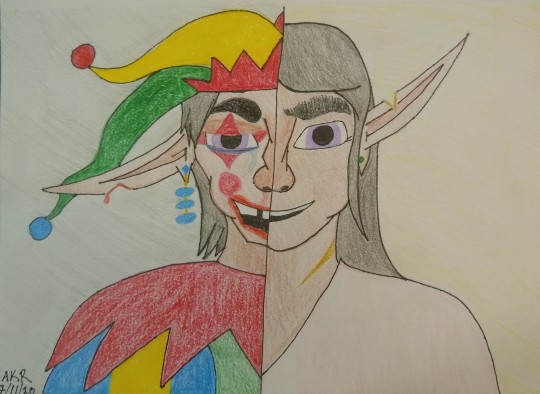
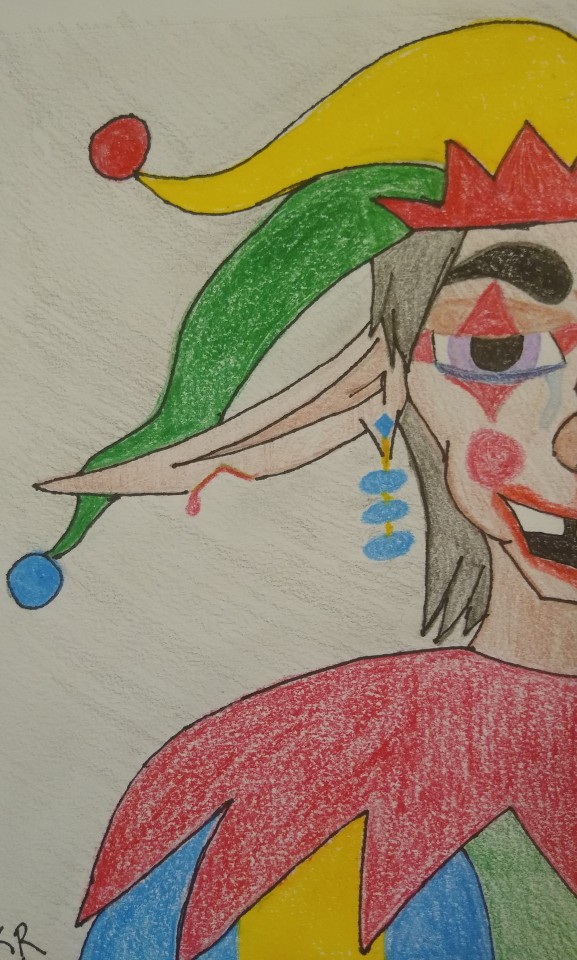
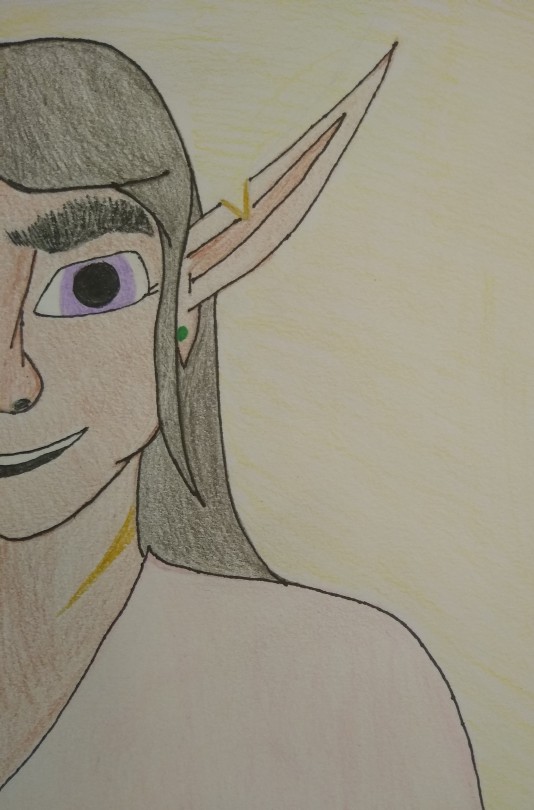
[Image description: A colored pencil drawing of Salgant from The Fall of Gondolin. Salgant is a chubby elf man with lavender eyes, dark hair, and light brown skin. The drawing depicts Salgant from the chest up, divided vertically down the middle of the page into two distinct images. On the left, Salgant is wearing a brightly colored jester’s costume, complete with makeup, a hat, and a dangling blue earring; he has a black eye, a bloody nose, and a missing tooth visible in a forced, wide smile; he is crying and a tear in his ear is bleeding; his hair has been cut short and he looks absolutely miserable. On the right, Salgant is wearing a simple pale pink robe and a genuine smile; he bears a few scars on his neck and ear, but he is otherwise healed and recovered; his hair has grown out and he looks cheerful and more plump. End image description.]
July 10, 2020
(technically it’s the 11th but shhh) for @tolkiengenweek day 5: diversity!
This is kind of a complicated headcanon! So, in the Book of Lost Tales, Tolkien says this concerning Salgant’s fate during the Fall of Gondolin:
But none could say where Salgant was, nor can they now. Mayhap he was whelmed by fire upon his bed; yet some have it that he was taken captive to the halls of Melko and made his buffoon—and this is an ill fate for a noble of the good race of the Gnomes.
Since that’s the most information we have about Salgant, I took that detail and ran wild with it. In my headcanon, he was indeed taken captive and made a buffoon of Morgoth, dressed up and forced to make a mockery of himself and his former nobility for Morgoth’s entertainment. This was a terrible time for him - he was beaten and lost weight and generally had an awful time of it.
But when the War of Wrath rolled around and Morgoth was defeated, Salgant was rescued and taken back to Valinor. He spent a long time in Lórien healing from his torments, and when he finally felt whole again (the right half of the picture) he devoted himself to Irmo and Estë and became a therapist of sorts for other traumatized elves, helping them with his harp and his humor and his patience. (I very briefly referenced this in ATATYA ch3!)
The “diversity” comes in a few forms here - I’ve drawn him with brown skin; he’s the only elf Tolkien ever described as fat (which. is An Issue.); I think he probably had some anxiety even in Gondolin and he suffered from a lot of trauma in Angband that permanently altered his brain chemistry; he was arguably gay for Maeglin depending on your reading. So we have a fat, brown, neurodivergent, + queer elf. Poor guy went through a lot, but in my mind he turns out alright in the end <3
#tolkiengenweek#silmarillion#the fall of gondolin#fall of gondolin#tfog#salgant#annaquenta art#colored pencil#july 10#july 11#2020#tolkien drawings
22 notes
·
View notes
Photo
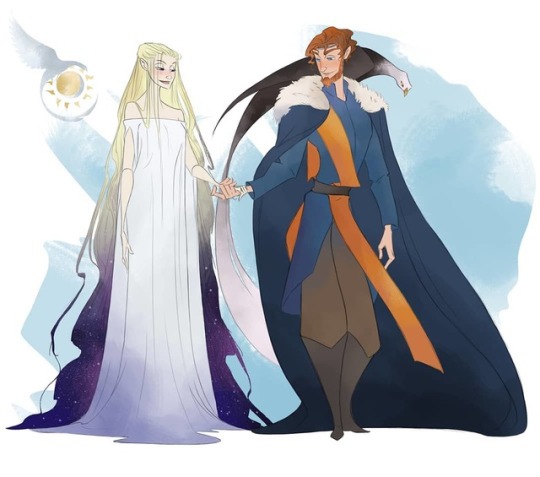
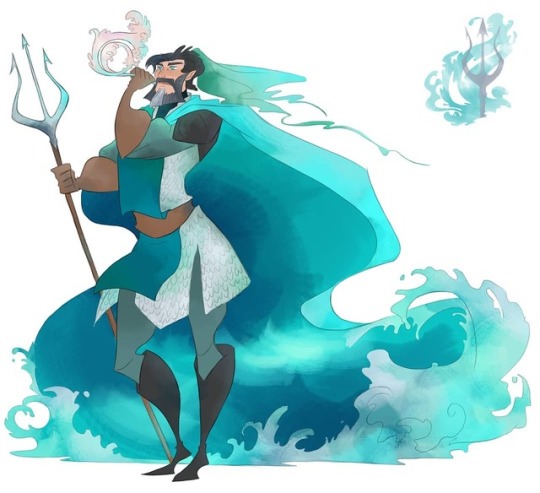

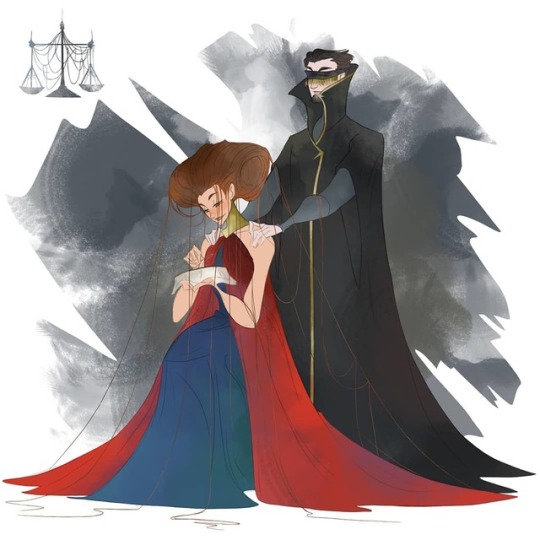
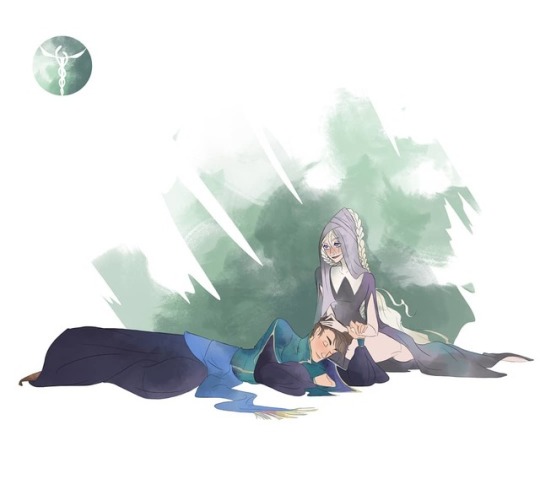

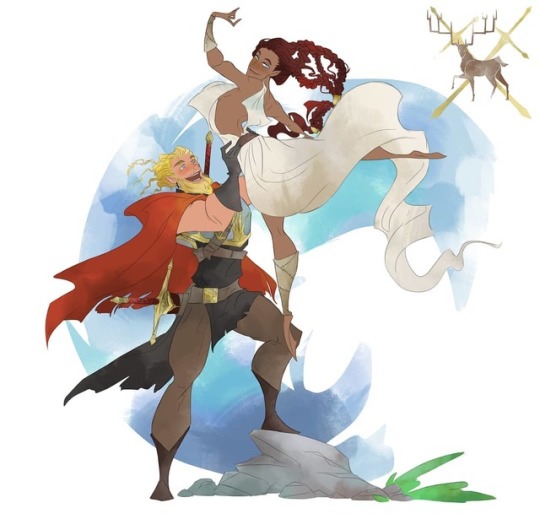


Valar & Valier by https://www.instagram.com/0.p.a.l.e/
1. "Manwë and Melkor were brethren in the thought of Ilúvatar. The mightiest of those Ainur who came into the World was in his beginning Melkor; but Manwë is dearest to Ilúvatar and understands most clearly his purposes. He was appointed to be, in the fullness of time, the first of all Kings: lord of the realm of Arda and ruler of all that dwell therein. In Arda his delight is in the winds and the clouds, and in all the regions of the air, from the heights to the depths, from the utmost borders of the Veil of Arda to the breezes that blow in the grass. Súlimo he is surnamed, Lord of the Breath of Arda. All swift birds, strong of wing, he loves, and they come and go at his bidding.
With Manwë dwells Varda, Lady of the Stars, who knows all the regions of Eä. Too great is her beauty to be declared in the words of Men or of Elves; for the light of Ilúvatar lives still in her face. In light is her power and her joy. Out of the deeps of Eä she came to the aid of Manwë; for Melkor she knew from before the making of the Music and rejected him, and he hated her, and feared her more than all others whom Eru made. Manwë and Varda are seldom parted, and they remain in Valinor. Their halls are above the everlasting snow, upon Oiolossë, the uttermost tower of Taniquetil, tallest of all the mountains upon Earth. When Manwë there ascends his throne and looks forth, if Varda is beside him, he sees further than all other eyes, through mist, and through darkness, and over the leagues of the sea. And if Manwë is with her, Varda hears more clearly than all other ears the sound of voices that cry from east to west, from the hills and the valleys, and from the dark places that Melkor has made upon Earth. Of all the Great Ones who dwell in this world the Elves hold Varda most in reverence and love. Elbereth they name her, and they call upon her name out of the shadows of Middle-earth, and uplift it in song at the rising of the stars."
2. "Ulmo is the Lord of Waters. He is alone. He dwells nowhere long, but moves as he will in all the deep waters about the Earth or under the Earth. He is next in might to Manwë, and before Valinor was made he was closest to him in friendship; but thereafter he went seldom to the councils of the Valar, unless great matters were in debate. For he kept all Arda in thought, and he has no need of any resting-place. Moreover he does not love to walk upon land, and will seldom clothe himself in a body after the manner of his peers. If the Children of Eru beheld him they were filled with a great dread; for the arising of the King of the Sea was terrible, as a mounting wave that strides to the land, with dark helm foam-crested and raiment of mail shimmering from silver down into shadows of green. The trumpets of Manwë are loud, but Ulmo.s voice is deep as the deeps of the ocean which he only has seen.
Nonetheless Ulmo loves both Elves and Men, and never abandoned them, not even when they lay under the wrath of the Valar. At times he win come unseen to the shores of Middle-earth, or pass far inland up firths of the sea, and there make music upon his great horns, the Ulumúri, that are wrought of white shell; and those to whom that music comes hear it ever after in their hearts, and longing for the sea never leaves them again. But mostly Ulmo speaks to those who dwell in Middle-earth with voices that are heard only as the music of water. For all seas, lakes, rivers, fountains and springs are in his government; so that the Elves say that the spirit of Ulmo runs in all the veins of the world. Thus news comes to Ulmo, even in the deeps, of all the needs and griefs of Arda, which otherwise would be hidden from Manwë."
3. "Aulë has might little less than Ulmo. His lordship is over all the substances of which Arda is made. In the beginning he wrought much in fellowship with Manwë and Ulmo; and the fashioning of all lands was his labour. He is a smith and a master of all crafts, and he delights in works of skill, however small, as much as in the mighty building of old. His are the gems that lie deep in the Earth and the gold that is fair in the hand, no less than the walls of the mountains and the basins of the sea. The Noldor learned most of him, and he was ever their friend. Melkor was jealous of him, for Aulë was most like himself in thought and in powers; and there was long strife between them, in which Melkor ever marred or undid the works of Aulë, and Aulë grew weary in repairing the tumults and disorders of Melkor. Both, also, desired to make things of their own that should be new and unthought of by others, and delighted in the praise of their skill. But Aulë remained faithful to Eru and submitted all that he did to his will; and he did not envy the works of others, but sought and gave counsel. Whereas Melkor spent his spirit in envy and hate, until at last he could make nothing save in mockery of the thought of others, and all their works he destroyed if he could.
The spouse of Aulë is Yavanna, the Giver of Fruits. She is the lover of all things that grow in the earth, and all their countless forms she holds in her mind, from the trees like towers in forests long ago to the moss upon stones or the small and secret things in the mould. In reverence Yavanna is next to Varda among the Queens of the Valar. In the form of a woman she is tall, and robed in green; but at times she takes other shapes. Some there are who have seen her standing like a tree under heaven, crowned with the Sun; and from all its branches there spilled a golden dew upon the barren earth, and it grew green with corn; but the roots of the tree were in the waters of Ulmo, and the winds of Manwë spoke in its leaves. Kementári, Queen of the Earth, she is surnamed in the Eldarin tongue."
4. "The Fëanturi, masters of spirits, are brethren, and they are called most often Mandos and Lórien. Yet these are rightly the names of the places of their dwelling, and their true names are Námo and Irmo.
Námo the elder dwells in Mandos, which is westward in Valinor. He is the keeper of the Houses of the Dead, and the summoner of the spirits of the slain. He forgets nothing; and he knows all things that shall be, save only those that lie still in the freedom of Ilúvatar. He is the Doomsman of the Valar; but he pronounces his dooms and his Judgements only at the bidding of Manwë. Vairë the Weaver is his spouse, who weaves all things that have ever been in Time into her storied webs, and the halls of Mandos that ever widen as the ages pass are clothed with them."
5. "Irmo the younger is the master of visions and dreams. In Lórien are his gardens in the land of the Valar, and they are the fairest of all places in the world, filled with many spirits. Estë the gentle, healer of hurts and of weariness, is his spouse. Grey is her raiment; and rest is her gift. She walks not by day, but sleeps upon an island in the tree-shadowed lake of Lórellin. From the fountains of Irmo and Estë all those who dwell in Valinor draw refreshment; and often the Valar come themselves to Lórien and there find repose and easing of the burden of Arda."
6. "Mightier than Estë is Nienna, sister of the Fëanturi; she dwells alone. She is acquainted with grief, and mourns for every wound that Arda has suffered in the marring of Melkor. So great was her sorrow, as the Music unfolded, that her song turned to lamentation long before its end, and the sound of mourning was woven into the themes of the World before it began. But she does not weep for herself; and those who hearken to her learn pity, and endurance in hope. Her halls are west of West, upon the borders of the world; and she comes seldom to the city of Valimar where all is glad. She goes rather to the halls of Mandos, which are near to her own; and all those who wait in Mandos cry to her, for she brings strength to the spirit and turns sorrow to wisdom. The windows of her house look outward from the walls of the world."
7. "Greatest in strength and deeds of prowess is Tulkas, who is surnamed Astaldo, the Valiant. He came last to Arda, to aid the Valar in the first battles with Melkor. He delights in wrestling and in contests of strength; and he rides no steed, for he can outrun all things that go on feet, and he is tireless. His hair and beard are golden, and his flesh ruddy; his weapons are his hands. He has little heed for either the past or the future, and is of no avail as a counsellor, but is a hardy friend. His spouse is Nessa, the sister of Oromë, and she also is lithe and fleetfooted. Deer she loves, and they follow her train whenever she goes in the wild; but she can outrun them, swift as an arrow with the wind in her hair. In dancing she delights, and she dances in Valimar on lawns of never-fading green."
8. "Oromë is a mighty lord. If he is less strong than Tulkas, he is more dreadful in anger; whereas Tulkas laughs ever, in sport or in war, and even in the face of Melkor he laughed in battles before the Elves were born. Oromë loved the lands of Middle-earth, and he left them unwillingly and came last to Valinor; and often of old he passed back east over the mountains and returned with his host to the hills and the plains. He is a hunter of monsters and fell beasts, and he delights in horses and in hounds; and all trees he loves, for which reason he is called Aldaron, and by the Sindar Tauron, the Lord of Forests. Nahar is the name of his horse, white in the sun, and shining silver at night. The Valaróma is the name of his great horn, the sound of which is like the upgoing of the Sun in scarlet, or the sheer lightning cleaving the clouds. Above all the horns of his host it was heard in the woods that Yavanna brought forth in Valinor; for there Oromë would train his folk and his beasts for the pursuit of the evil creatures of. Melkor. The spouse of Oromë is Vána, the Ever-young; she is the younger sister of Yavanna. All flowers spring as she passes and open if she glances upon them; and all birds sing at her coming."
9. " Last of all is set the name of Melkor, He who arises in Might. But that name he has forfeited; and the Noldor, who among the Elves suffered most from his malice, will not utter it, and they name him Morgoth, the Dark Enemy of the World. Great might was given to him by Ilúvatar, and he was coeval with Manwë. In the powers and knowledge of all the other Valar he had part, but he turned them to evil purposes, and squandered his strength in violence and tyranny. For he coveted Arda and all that was in it, desiring the kingship of Manwë and dominion over the realms of his peers.
From splendour he fell through arrogance to contempt for all things save himself, a spirit wasteful and pitiless. Understanding he turned to subtlety in perverting to his own will all that he would use, until he became a liar without shame. He began with the desire of Light, but when he could not possess it for himself alone, he descended through fire and wrath into a great burning, down into Darkness. And darkness he used most in his evil works upon Arda, and filled it with fear for all living things."
#tolkien#silmarillion#valar#valier#manwe#varda#ulmo#yavanna#aule#nienna#namo#mandos#vaire#este#irmo#lorien#tulkas#este the grey#vana#orome#nessa#melkor
674 notes
·
View notes
Note
Remember that nightmare!irmo drabble you gave us? Could you tell us more about who he is as a person and just how is brain works in general? We need more dark Irmo 😩
Of course I do~ now let me see...
Nightmare!Irmo has strong, wild emotions and is the epitome of unpredictable, but he also is quite a cunning creature: He knows how to make himself pretty and appear harmless and he can also sense the desires of his prey, so he'll know exactly how to approach them; at times he may also make use of his song and potions.
The emotions of others are like a drug for him, especially the fear caused by the nightmarish visions he gently plants in his sleeping victims' dreams and the forbidden lust and desires he extracts from the depths of their minds. At first he felt guilty for "feeding" on them (in canonverse, Valar don't need sustenance, though that doesn't mean they can't indulge), but then he got used to it, and his impulse control fails him at times. Depending on whether other Valar are also dark versions of themselves in a given verse, Námo, Nienna and Estë may have either scolded him for it or enabled him. Either way, they may be willing to cover for him, at least to a certain degree.
Most of the time, Irmo's victims don't know what happened, nor remember anything. They wake up in Lórien and feel a little disoriented and/or empty, but he tells them that this is merely the effect of his magical gardens and they had a deep, restful sleep. Because of this, many return voluntarily, and Irmo always has fun little playthings around.
If he likes a particular person a lot - maybe their fëa is just particularly delightful, be it the way they experience emotions or he considers them beautiful - he may keep them permanently. He places them in a field of sleep-inducing flowers and keeps them in an endless dream, which he also inserts himself into if he wishes to spend time with them. You could live an entire dream life with your dream lover Irmo and be none the wiser; and nightmares may then be a useful tool to make you dependent on his love and protection. The only way to wake up from this endless dream is if he allows it - but this version of Irmo doesn't like it when his favourite little butterfly escapes his dreamy net and can become obsessive.
#hope you enjoyed!#irmo#lorien#nightmare irmo#dark irmo#headcanons#my headcanons#alternate universe#silmarillion
26 notes
·
View notes
Text
A Question of Precedence
I was having difficulty writing this one, and then I remembered it had been a while since I’d done a bullet point fic and tried to write it that way. Things went much faster after that.
Feanor is born too soon. Miriel dies within an hour of the birth. Feanor lasts only a day longer. The healers say that he might have lived if his mother had - that his spirit is still so closely bound to hers that she might have been able to sustain him. But Miriel dies, and a day later, her son follows.
(Finwe holds him from the moment the midwife hands him over to the moment his son takes his last breath. He’d have poured out every drop of his fëa if it would have saved his son, but there is nothing he can do.)
Miriel refuses to return, and Estë warns that without her, there is no point in returning Feanor to the world. He will die again just as quickly.
Finwe pleads with his wife to return for their son’s sake if nothing else, but Miriel refuses him.
Finwe cannot forgive her for this.
(Miriel wishes she could find some way to explain the cold weight and bottomless weariness even the thought of returning brings her. She holds the shade of her son in her arms and weeps for him, but no matter how she tries, she cannot find the strength to return. Not even for him.)
Finwe eventually remarries, though he waits longer to do it. Giving up on Miriel means giving up on Feanor too, but he has come to believe both are lost to him, and he can’t bear to face all of eternity alone.
Indis gives birth to Findis. Finwe is overjoyed both are healthy and secretly relieved it’s a girl. It’s . . . easier that way, at least for the first.
Then there’s Nolowfinwe, Irimë, and Arafinwe. All healthy. All safe.
But he never forgets Feanor.
Melkor is eventually released and inevitably stirs up trouble. This time, though, Feanor has almost nothing to do with it.
Finwe’s heir is still in question, though.
Findis is Finwe’s oldest surviving child. Many believe she should serve as his heir.
But inheritance is a rarely used concept among the elves as of yet. Nothing is set in stone. Should this be determined by birth or Finwe’s choice? And since all of their original leaders were male, should their potential replacements be male too?
More pressingly, Findis is . . . Well, all of Finwe’s surviving children are half-Vanyar, of course. But Findis is particularly Vanyar. She looks and acts far more Vanyar than Noldor, and the Noldor aren’t thrilled with that fact in a potential heir.
Nolofinwe, on the other hand, could easily pass as a full Noldor. And though his is loathe to do anything that could be at all construed as trying to usurp the crown from his sister, he has to admit, if only to himself, that he wants it, and he’s not at all sure that Findis does.
Findis doesn’t. Not exactly. She does, however, resent everyone that suggests that she couldn’t do a perfectly good job
(No one particularly considers either Irimë or Arafinwe since Irimë spends as much of her time as she can running wild through the forest, and Arafinwe is both the youngest and suspiciously Vanyar in appearance to boot. Both are fine with this, though Irimë occasionally likes to complain for the sake of it.)
There’s no open fighting between the siblings, but things get progressively more heated amongst their supporters. Indis wants Finwe to step in and officially proclaim a heir to make it stop. Finwe hates the idea of appearing to choose between his children. He quietly thinks that if Feanor was still alive they wouldn’t be having this problem; Feanor is his firstborn, fully Noldor, and to top it all off, male. That’s a wish, though, not a plan. His plan is currently just to live forever and render the point moot, a plan that, while flawed, is at least more plausible for elves than anyone else.
There are no Silmarils this time around, just steadily increasing tensions that finally erupt into a full-scale riot.
When the Valar intervene, Melkor’s intervention is discovered.
No one is exiled, but there is a reconciliation scheduled once tempers have cooled. They meet at the Trees.
Which Melkor destroys.
In the chaos, he also kills Finwe for the sake of stirring up trouble.
There is no possible way to avoid the succession issue now.
Nolofinwe is furious and grieved at his father’s death. He argues passionately that they should pursue his murderer.
Findis is more cautious. They should trust the Valar, she argues. Light will surely be restored soon. They cannot possibly hope to fight a Valar on their own.
The succession issue is resolved, more or less, by those who wish to go to Beleriand with Nolowfinwe following him to the shore and those who don’t staying under Findis’s leadership.
The Teleri refuse to give them the boats, but though it’s suggested, Nolofinwe refuses to steal them. Instead, they take the path of the Grinding Ice.
(By the time they arrive, Círdan’s forces will be long dead, as will many of the Avari. Only those within the protection of the Girdle or far from Angband will still be grimly holding on. Even with no Doom, there is a long hopeless war in front of them.)
Findis faces problems of her own. While many of those who stayed are her supporters, others stayed for other reasons and resent her rule.
And . . . all of her siblings have gone to Beleriand. She can’t help feeling that’s a comment on her.
Her mother, in her grief, returns to the Vanyar. Findis wishes desperately she could have gone with her and swallows down the feeling that she’s been abandoned.
Meanwhile, Finwe’s found Miriel and has told her everything.
And Miriel thinks . . . maybe. Maybe she can return to life, or at least something resembling it.
She goes to weave for Vaire.
And she takes Feanor with her.
He grows little by little. When he’s big enough, she knows he has to leave. This half-life is no place for a child.
So she sends him to the only family she can.
She sends him to Findis.
Findis has had the crown for a few years by now. She’s proven her point. She can do this. She just doesn’t want to.
And Feanor is the perfect excuse.
She invents the term regent and declares that Feanor will be the next king.
Feanor grows up with a good deal of curiosity about his absent siblings and a confused mess of emotions about his parents and step-mother. He wishes fiercely that he could have gone to Beleriand to fight, to explore, and to do great deeds and avenge the father he doesn’t remember.
He’s as brilliant as he was always destined to be, but the Silmarils aren’t a possibility now. He makes lesser gems that capture the light of sun, moon, and stars, and wishes he could have seen this light that others mourn.
You saw it once, Findis reminds him. For just one day. I can still see the light of it in your eyes.
He does still invent Tengwar. It’s adopted quickly.
When he comes of age and Findis is convinced he isn’t going to burn Tirion down in one of his experiments, she abdicates and goes to live with her mother’s family. Feanor gets busy being king . . . and wooing Nerdanel.
Nerdanel is older than him, that’s true, but he’s determined not to let that stop him.
It does stop Nerdanel for quite some time. But with every decade that passes, the less significant the age gap becomes.
Eventually, she says yes.
They have seven sons.
The twins are still very young when Namo breaks his long silence on the fate of those in Beleriand and makes an announcement that causes the biggest stir Aman’s seen since the Sun came up for the very first time.
Nolowfinwe’s eldest son, Fingon, is dead.
And for the heroism he showed in Beleriand, it’s been decided that he’ll be returned early. This week, in fact.
Fingon emerges from Mandos’s Halls to be greeted by an uncle that is simultaneously far older and far younger than him and who is very, very eager to hear absolutely everything about Beleriand and everyone who’s there.
Fingon is bewildered by pretty much everything that’s going on, but he’s also very, very eager to share what’s going on, mostly in the interest of getting reinforcements.
Feanor isn’t nearly as hard to convince as he was expecting.
#feanor#miriel#finwe#findis#indis#fingolfin#finarfin#lalwen#nerdanel#fingon#valar#alternate universe#temporary character death#tolkien#silmarillion#first age#fic
333 notes
·
View notes
Text
Headcanon: The Fate of Elured and Elurin
The first chapter of “The Hobbit” claims that there is something “not entirely hobbitlike” about the Tooks, leading to a rumor that one of their ancestors “must have taken a fairy wife”. Though this anecdote is never elaborated on, a lot of fans have interpreted it to mean that the Took clan-like the royal lineage of Numenor-has Maia blood. The question is: which Maia?
My headcanon is that, like the aforementioned kings of Numenor, the Tooks are descended from the Maia Melian. But while the former are descended from Melian via her great-grandaughter, Elwing; the latter are descended from Melian via at least one of her great-grandsons, Elured and Elurin.
It is canon that Maedhros never found Elured or Elurin’s bodies, which in fiction land almost certainly means that they didn’t die. Some of the Nandor-ancestors of the Green Elves-told stories about the lost twins being led to safety by birds and wild beasts, which sounds incredibly silly until you remember that their great-grandmother was a Maia of Vana. Though Melian was said to have left Middle Earth after her husband’s murder, I doubt that she abandoned her family entirely.
For obvious reasons; Melian knew that her great-grandsons wouldn’t be safe anywhere in Beleriand, or in Valinor if they were even permitted to go there. So she-who served Estë as well as Vána-approached the Feanturi for advice. As the Valar of Death and of Dreams, respectively, Namo definitely-and Irmo probably-knew about the hobbits. Regardless of which brother Melian sought the council of, she was told of a valley east of the Misty Mountains (remember that the hobbits did not migrate to the Shire until the early Third Age) where her great-grandsons could live happy and safe.
It would have been quite a trek, even with divine assistance. Fortunately, elf children are a bit more durable than their human counterparts. After reaching their destination, Elured and Elurin were adopted by a nice hobbit family, and had remarkably happy childhoods considering the circumstances. After reaching adulthood, at least one of the brothers fell in love with and married a hobbit; eventually having at least one (no doubt adorable) half-halfling child.
After the War of Wrath, Irmo appeared to Elured and Elurin in their dreams, offering them the same choice offered to their sister, brother-in-law, and nephews. But instead of choosing the Gift of Men or the Life of the Eldar, the brothers-who by that point, had few if any clear memories of their lives before meeting the hobbits-made the same request as their grandmother before them: to go to same place as the people they loved. (I am firmly convinced that hobbits are an entirely seperate species from humans, and thus do not share the same afterlife.)
Ages passed, and Elured and Elurin’s descendents florished. By the time of the War of the Ring, the only apparent signs of their mixed lineage were taller-than-average heights (Bandobras “Bullroarer” Took was tall enough to ride a horse), longer-than-average lifespans (Bilbo’s grandfather, Gerontius, wasn’t called “The Old Took” for nothing), and of course, a higher-than-average thirst for adventure.
I admit, the canonical evidence for my headcanon is circumstantial at best. But if nothing else, you can’t deny how poetic it would be for a descendent of Elu Thingol to have helped the dwarves reclaim their stolen home.
22 notes
·
View notes
Note
What do you headcanon the Valar looking like? I'm curious :3
My level of precision regarding character designs heavily depends upon my level of interest in said characters, but here we go:
1) Manwë: pale-skinned (almost as white as clouds on a summer day); long white hair (white, not silver); blue eyes (but they change with his mood); tallest of the Valar; lean but still muscled; full lips; his back is entirely tattooed.2) Melkor: tanned; long and wild black hair, curls; golden eyes; slightly less tall than Manwë; a bit more muscled than Manwë but not much; full lips.3) Varda: dark-skinned; long, curly black hair; silver eyes; petite; small breasts; full lips.4) Oromë: dark-skinned; brown hair, dreadlocks; golden eyes (but less pale than Melkor’s); muscled; nose piercing; lots of tattoos.5) Ulmo: tanned; blueish, curly black hair, braided together with bones of sea creatures; NO BEARD; deep blue eyes; a couple of tattoos; as tall as Melkor.6) Tulkas: Chris Hemsworth but slightly more tanned and with red hair. :“D7) Aulë: dark-skinned; golden-haired; long, braided hair; bearded but no moustache; least tall of the male Valar; brown eyes; large hands.8) Yavanna: dark-skinned; wavy brown hair; green eyes; large breasts; barefooted. 9) Irmo: pale-skinned (but not as pale as Manwë), long silver hair; large, deep purple eyes; lean; not that tall.10) Estë: the same as Irmo but then in female form. :"D I have to think about her more often.11) Námo: this one’s hard since I haven’t formed a definite picture of him yet. Now it is: pale-skinned, sleek grey hair; grey eyes (almost white); taller than Irmo. 12) Vairë: dark-skinned; middle-length black hair; taller than Námo; black eyes.13) Nienna: pale-skinned; curly grey hair; blue eyes; tall.
I think it’s very noticeable who my favorites are and whom I’m not interested in. *hides in shame* But thank you for asking. :) X
2 notes
·
View notes